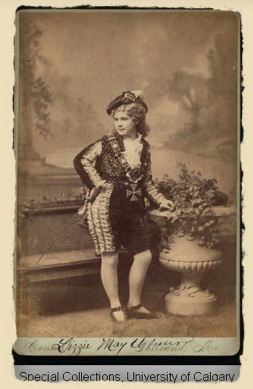This stage photo of Lizzie May in costume is owned by the George Stewart collection at the University of Calgary,a fantastic collection of photos of the stage in the late 19th century.
The University of New Brunswick Libraries is a treasure trove of antique theater posters. I was so excited to find playbills to two plays that Lizzie May acted in at the start of her career. In fact, these are the only mentions that I can find for the 1875 season as unfortunately so much from that time period has been lost. Tracing the steps of this young actress’ career in the late 19th century shows that Lizzie May led an extraordinary life
Lizzie May acted steadily throughout 1874 building a career in small roles and productions throughout the North East. On September 11, 1875 she had a leading role in the play Divorce by Robert Reece at the Portland Museum Theatre in Portland, ME. This was not a huge role in a huge production in a huge city but it did connect her with a well-known playwright of the day. Robert Reece (1838– 1891) was a British comedic playwright and librettist (opera/musical theatre) popular through the 1870’s. He wrote flashy musical burlesques and the comic operas that were all the rage. Reece was also popular for his sarcastic farces and for adapting popular French operettas into English. Lizzie May was starting to act in bigger productions by well-known writers increasing her visibiliy greatly and advancing her career.
A month later on October 9,1875 Lizzie May was once again at the Portland Museum Theatre appearing in a lesser known play by Dion Boucicault. Boucicault was a popular Irish actor and celebrated playwright. According to wikipedia:
Boucicault was an excellent actor, especially in pathetic parts. His uncanny ability to play these low-status roles earned him the nickname “Little Man Dion” in theatrical circles. His plays are for the most part adaptations, but are often very ingenious in construction. They have had great popularity.
Lizzie May was a traveling actress, a mother to a 2 year old (baby George Jr. was born in 1873) and a wife. Somehow she managed to juggle it all. It is interesting to note that her husband/step-brother George was not listed on the playbills for these performances. Maybe he was taking care of the baby on the nights that Lizzie performed? Or perhaps her career was starting to take off but he had yet to find his niche.

 The Army of the Potomac Paraded Down Pennsylvania Avenue
The Army of the Potomac Paraded Down Pennsylvania Avenue